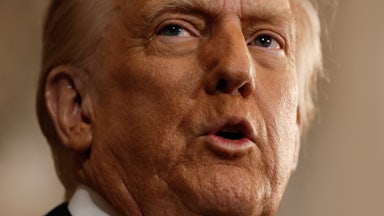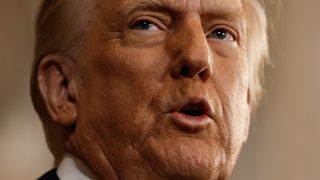When Judge Aileen Cannon granted former President Donald Trump’s request that she appoint a special master to review government documents he carted off to Mar-a-Lago and then refused to turn over to the National Archives, she didn’t follow the law. I’m no legal expert, but when William Barr and Laurence Tribe agree that a judicial ruling is wrong, who am I to disagree?
Still, nobody familiar with America’s cult of the special master should be surprised that a Trump appointee in good standing with the Federalist Society would employ this particular dodge. Over the past 20 years, privatizing key government functions through the appointment of special masters has become a routine maneuver to review documents, dispense cash, or supervise government functions like the administration of prisons. In other, less litigious nations they assign these duties, more appropriately, to government officials. Appointing a special master is also, like the creation of a national commission, a nifty way to pass the buck.
Special masters exist because in 1280, King Edward I felt overwhelmed by the volume of petitions he received and decided to make his highest-ranking adviser read them instead. His highest-ranking adviser was the lord chancellor. (Thomas à Becket, Sir Thomas More, and Cardinal Wolsey were all lord chancellors.) Lord chancellors relied on clerks to help sort through the petitions, and by the fifteenth century these clerks were called masters.
Eventually this function devolved to judicial bodies called chancery courts. The United States didn’t have chancery courts after the Revolution, but judges still followed a distinct set of rules in “equity” (i.e., chancery) cases to resolve nonmonetary claims, and they still relied on masters to advise them. In 1937, the United States made some technical changes that rendered masters an anachronism. But Rule 53 of the Federal Rules of Procedure defines “master” very broadly, and as litigation became more voluminous and complex during the second half of the twentieth century, masters (now called “special” masters) were called in to help resolve all sorts of cases. By 2000, a government report concluded, about 450 special masters were being appointed in the federal courts each year.
Then came 9/11. Fearing that American Airlines and United Airlines, four of whose airplanes were commandeered by the terrorists, would be bankrupted by lawsuits filed by victims’ families, Congress effectively indemnified the airlines through creation of a taxpayer-funded Victim Compensation Fund. Kenneth Feinberg, an experienced mediator who previously had worked as a prosecutor and chief of staff to Senator Ted Kennedy, was installed as special master and given nearly $7 billion to hand out.
Feinberg raised special masters’ profile so high that in 2004 they gathered in St. Paul, Minnesota, for the first-ever special master’s convention. (I like to imagine a big banner that says, “Welcome, Special Masters!”) The main order of business was to create a special master professional society, the Academy of Court-Appointed Masters. The name was subsequently changed to the Academy of Court-Appointed Neutrals to avoid the word master’s historic association with slave ownership.
“Special master” became an honest-to-God occupation. David Cohen, who is a special master in federal cases, told NPR that “special master really is kind of a fancy name for judge’s helper.” There are want ads of a kind for special masters. A 2015 “vacancy announcement” by the court of federal claims invites applicants for a renewable four-year term as special master on vaccine injuries and deaths. “Must have at least five years of experience in the active practice of law,” the announcement says, “or other legal experience which is suitable as a substitute.” More recently, the Justice Department advertised a vacancy for special master for the United States Victim of State Sponsored Terrorism Fund (different from Feinberg’s Victim Compensation Fund, but also created by Congress). Preference will be given to candidates who have previously been “special master or equivalent position administering a complex, multiple-claimant compensation fund.” Special mastery is now so common that employers demand previous experience as a special master!
Feinberg is the King Kong of special masters. The Academy of Court-Appointed Mas—I mean, Neutrals—bestows an annual Kenneth Feinberg Pro Bono Award, given “to individuals for their tireless peacemaking service for victims and the needy.” The first recipient, in 2017, was, of course, Kenneth Feinberg. After 9/11, Feinberg was special master of a memorial fund raised privately to compensate victims of the 2007 mass shooting at Virginia Tech. After that, Feinberg was special master of the 2008–9 bank bailout, ruling on how much to slash payments to those firms’ top executives. After that Feinberg was appointed special master of victim assistance funds for the 2012 mass shootings in Aurora, Colorado, and the 2013 Boston Marathon bombings. Feinberg wasn’t called special master on every one of these assignments, but that’s what he was.
What’s the trouble with special masters? They’re unaccountable. Indeed, that’s often why Congress or the judiciary or the executive branch turns to one. They are temporary hires from the private sector paid in court by both sides in a dispute (often involuntarily). Or they’re temporarily put on the federal payroll to resolve a dispute and then leave before the squawking begins.
The Treasury Department appointed Feinberg special master in 2015 to distribute pension benefits to retirees in multi-employer pension funds whose employers had gone belly-up. The biggest of these, the Teamsters’ Central States Pension Fund, applied for these funds to be released. Under a law passed the previous year, carefully negotiated with the Teamsters and other stakeholders, the pension holders were to be disbursed benefits at a heavily discounted rate because the Pension Benefit Guarantee Corporation, which insured Central States, was broke. But the Teamsters then decided they didn’t like that deal.
The Obama administration was in a bind. It didn’t want to anger an important union as the 2016 election was approaching, but it also didn’t want to leave the multi-employer pensions’ pending bankruptcy unaddressed. In the end, it was left up to Feinberg. He declined the Central States’ request for disbursements, creating a multi-employer pension crisis that lasted several years. (It was finally resolved last year, more satisfactorily than in 2014, in Biden’s American Rescue plan.) The Treasury Department deflected the heat to Feinberg, who moved on to his next special master assignment.
Our society’s longing for special masters to solve an increasing number of problems is yet another sign that democracy is not in good health. We already have members of Congress and civil servants to address the nation’s problems, but voters don’t trust them to make the right judgments. So they foist these problems onto the courts instead. Judges get overwhelmed, and they appoint special masters. Or Congress and the executive branch foist problems directly onto special masters so they don’t have to answer for the result.
Trump’s lawyers were smart to request a special master. It’s a surefire way to slow down a judicial proceeding, and implicitly it discredits as the “Deep State” the perfectly capable government officials at the Justice Department who’ve been reviewing the documents for potential prosecution. The judge’s decision lends credence to Trump’s extremely dubious claim of executive privilege concerning documents he isn’t supposed to have in his possession. But overuse of special masters in the past led us here. There are so many of these unaccountable agents at this point that it’s a wonder we still call them special.










